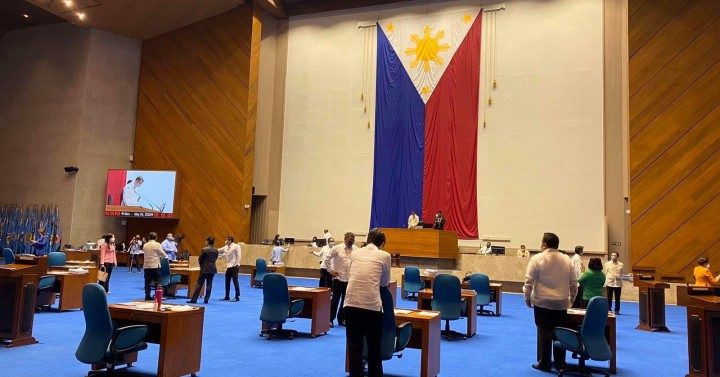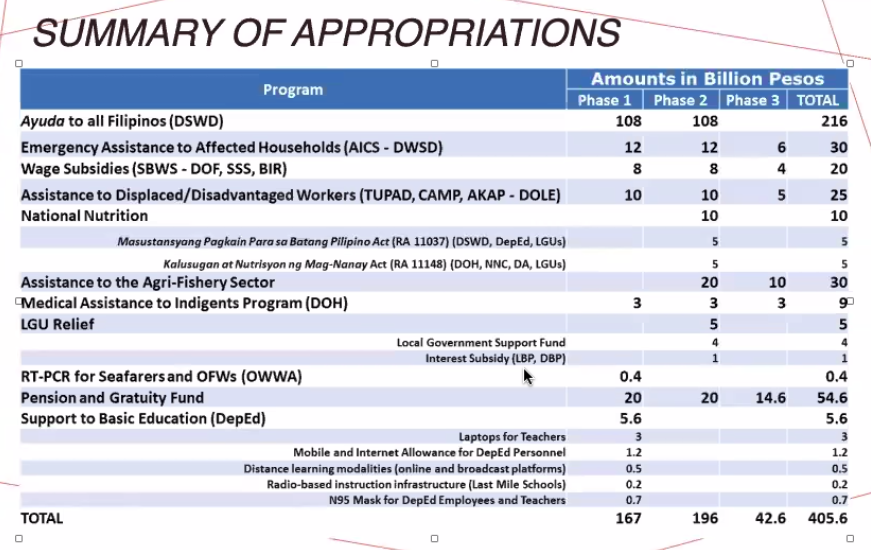SUMMARY
This is AI generated summarization, which may have errors. For context, always refer to the full article.

The House of Representatives opened deliberations on the ambitious Bayanihan to Arise As One bill or Bayanihan 3 stimulus package, which seeks to give out a total of P405.6 billion as aid for all Filipinos.
The debates commenced on Monday, May 24, with the bill entering the plenary with a total of 293 lawmakers who signed as co-authors.
During her sponsorship speech, House economic affairs committee chairperson AAMBIS-OWA Representative Sharon Garin said the support within the House reflects the urgent need of Filipinos across the country to receive aid.
“Let’s pass this swiftly, because this is what we have seen that our people need,” Garin said.
The bill’s biggest hurdle was securing sources of funding. Lawmakers still have not received a certificate of availability of funds from the Bureau of Treasury – a constitutional requirement in appropriations bills where the government declares it could fund a project.
The House also only has 5 session days left to pass the bill after Monday’s session. The Bayanihan 3 bill still has not been declared as urgent by President Rodrigo Duterte and has not moved forward at the Senate.
Why is it needed?
In her sponsorship speech, Marikina 2nd District Representative Stella Quimbo stressed the unprecedented levels of unemployment and hunger that the pandemic has inflicted on the Philippines.
“Bagsak na ang kita ng mga Pilipino, tumaas pa ang presyo ng bilihin…Kailangan na po ng ayuda ng taumbayan (The Filipino’s income fell, and the prices have risen…The nation needs help),” Quimbo said in her sponsorship speech.
Quimbo added that the approval of Bayanihan 3 would retain Duterte’s emergency powers as the pandemic continues to rage. Bayanihan 2, she said, would lapse in June 2021, and its aid package has been “severely lacking.”
The Marikina lawmaker added that the government “has learned its lesson” from the failures of the cash aid distribution in 2020, where outdated lists prevented aid to reach the people who needed it the most.
Bayanihan 3 promises that all Filipinos will receive at least P2,000, divided into the first two phases of the proposal.
First day questions
Despite the overwhelming support within the chamber, lawmakers still gave suggestions to improve the law, and pointed out provisions that needed revisions.
Former health secretary and Iloilo 1st District Representative Janette Garin suggested that proponents include a provision that would give P10,000 to all Filipinos who test positive for COVID-19. She said the main authors will consider the suggestion.
In his interpellation, Deputy Speaker and Cagayan de Oro 3rd District Representative Rufus Rodriguez questioned a portion of Section 5 of the bill, which said Filipinos need to reside in the Philippines for at least 6 months before they could qualify for aid.
Rodriguez, also a co-author of the bill, warned that the provision was “discriminatory” against overseas Filipino workers (OFW).
Rodriguez also flagged Section 3 of the bill, which said that aid would be given to “deserving Filipinos. ” He said “qualifying” Filipinos who would get aid was also against the intentions of the proponents.
Representative Sharon Garin said they would revise these two sections.
The biggest problem
The biggest question remained how the government could fund the massive stimulus package.
Rodriguez said proponents must spell out the target dates of implementation for phases 2 and 3 of the proposal. Rodriguez floated the possibility of the phases being implemented 3 months apart.
“How are we assured that the 2nd and 3rd phases will certainly be given? We cannot make it dependent on the agencies, on the different departments,” Rodriguez said.
Garin explained that the dates could not be specified for the time being as the government continued to scramble for funding sources.
Quimbo said they so far have a “ballpark estimate” from the Department of Finance (DOF) of possibly getting P63 billion from government-owned and controlled corporation (GOCCs). She said funds from 2021 budget realignments have yet to be computed.
Citing the Bangko Sentral ng Pilipinas (BSP), Quimbo added that the government could take out a loan as big as P282 billion.
“As to whether the economic managers still have the appetite to take out more loans, that’s another question,” Quimbo said in a mix of English and Filipino.
What’s in Bayanihan 3
The proposed Bayanihan 3 is divided into 3 phases, with the following budget breakdown:
- Phase 1 – P167 billion
- Phase 2 – 196 billion
- Phase 3 – P42.6 billion
The phases are ranked based on priority. Lawmakers are confident that Phase 1 could be funded by the government, while the next two phases could be funded as the government finds more sources of revenue.
Phases 1 and 2 contain the most anticipated aid giveaway – a total of P208 million that amounts to P2,000 per Filipino divided into two P-1,000 instalments for each phase.

The bill also contains help for vulnerable sectors, like the indigents, the unemployed, and the displaced.
Proponents prized the “layering” strategy of the bill, wherein those who need help the most would receive the most layers of aid: For example, an unemployed and displaced Filipino will get the P2,000 aid, and the allotted aid for both the unemployed and the displaced.
The bill also contains the P54.6 billion inserted pension funds for retired uniformed personnel, which was slashed from the 2021 budget in late 2020. – Rappler.com
Add a comment
How does this make you feel?


![[Time Trowel] Evolution and the sneakiness of COVID](https://www.rappler.com/tachyon/2024/02/tl-evolution-covid.jpg?resize=257%2C257&crop=455px%2C0px%2C1080px%2C1080px)


There are no comments yet. Add your comment to start the conversation.